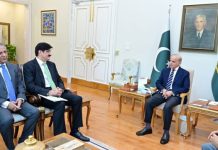KARACHI: Foreign Minister Khawaja Asif said that the United States is not a friend of Pakistan and the country needs to revisit its ties with Washington.
The minister said so while speaking exclusively to anchorperson’ on TV program.
The tweet by US President Donald Trump accusing Pakistan of giving nothing but lies and deceit, thinking US leaders to be fools, led to heightened tensions between Pakistan and the United States.
“They give safe havens to the terrorists we hunt in Afghanistan, with little help. No more!” he said on Monday.
Trump’s tweet followed a statement by the White House on Tuesday saying that it wanted to see Pakistan do more to fight terrorism and that it would likely announce actions to pressure Islamabad within days.
“The US behaviour is neither that of an ally nor of a friend,” Asif said. “It is a friend who always betrays.”
He also ruled out the perception that Pakistan had been diplomatically isolated.
The minister further said that in case of any aggression by the US, Pakistan would respond in a manner that would reflect the nation’s will.
Asked if his recent tweets were in a personal capacity or were as the foreign minister, he said that he has no individual worth and “is just a public representative”.
 The minister said his tweets represent the state’s response as long as he is not asked by the leadership to limit issuing such statements.
The minister said his tweets represent the state’s response as long as he is not asked by the leadership to limit issuing such statements.
The foreign minister maintained that there is always a difference between an individual’s and institutional reactions, adding that if the parliament responds to the allegations then it should be “closer to the public sentiment.”
“If the parliament adopts a resolution on the issue, it should be closer to the public sentiment,” Asif said. “This is a national issue and a matter of our dignity.”
Responding to a question regarding allegations by US National Security Advisor McMaster, he said, “I met McMaster and he told me that ‘you make promises, but don’t keep them, and our trust level is quite low’.”
“I told him we don’t have any trust level given what you did to us in the past 20-30 years,” the minister said, adding that the meeting, which lasted for less than half an hour, got over in the same tone.
His statement was a reference to post-Afghan war era, after the withdrawal of Soviet forces from Afghanistan.
“Soviet Union was not our enemy. We struggled against it, there was enough money coming in, but it devastated us,” Asif said.
“And we have been suffering to this day.”
‘Doubt their motives’
The Pakistani minister also raised questions over United States’ motives in the region.
“They, the US and allies, have the best and highly equipped forces. How come they could not perform in Afghanistan,” he questioned, noting that Pakistan fought a war with its own resources and it succeeded in Swat, Bajaur, North Waziristan and other areas.
“Why is there 9,000 tons of opium being produced in Afghanistan and why is Daesh present in as many as nine provinces,” Asif asked further. “Our objectives have been clear and we achieved them with the backing of the nation.”
“So I doubt their motives,” he added.
Can Pakistan survive without US aid?
Asked if Pakistan would be able to survive without US assistance, the minister said this isn’t the first time the US is threatening to cut off aid or has cut it off.
“They did the same during the time of 1965 war with India, and then after in 1971. They even usurped our money for F-16 jets.
“They left us in every difficult hour,” he said. “The world is vast enough and the US is not feeding us.”
US-India nexus
“The United States and India have a nexus, they understand their interests are same in the region,” the foreign minister told the anchorperson.
“They consider CPEC a threat to their interests and they have opened a joint front against the project.”
‘Militants have no permanent addresses’
Responding to US allegations of terrorist sanctuaries in Pakistan, Asif said the militants who cross into Pakistani territory from Afghanistan do not have permanent addresses and they keep moving.
“We have ended all sanctuaries and there is no organised presence here,” he maintained.
The minister also blamed the US and allies for their failure in tackling the Haqqani network.
Noting that the group comprises around 4000-6000 militants, he questioned, “How come a superpower can not control them.”
“I said in Washington that there is enough wreckage resulting from our association with the US and once assets have turned into liabilities today,” he said, in reference to the US policy shift pertaining to certain groups from time to time.
“Instability in this region suits them,” he said, when asked why the US doesn’t support fencing on the Pak-Afghan border, despite establishing a wall on its border with Mexico.
Drone attack in settled areas
The foreign minister, while responding to a question pertaining to drone attacks in the settled areas of the country, said the radical decline in such attacks is the biggest proof that there are no safe havens, no sanctuaries left on Pakistani soil now.
“But if they do, then our civil-military leadership should carve out a response to it with dignity and honour,” he said.
“The sacrifices we gave in the past years, we are indebted to those martyrs.”
‘US owes Pakistan $9bn for services it used’
The minister further said the United States owes $9bn to Pakistan, in return for its services in the war on terror.
“They used our airspace for free, for the then rulers sold out this nation and its interests to strengthen their rule,” he lamented. “Our airbases were given to the US, our roads were devastated.”
“If we monetise, the biggest usage was of our airspace, while they audit every penny they give us.”
Islamabad’s reaction to Trump tweet
Islamabad reacted strongly to the allegations and summoned the US ambassador to the Foreign Office in a rare public rebuke.
On Tuesday, a high-level huddle of the Pakistani civil-military leadership expressed disappointment over the US president’s anti-Pakistan statement, however, decided not to take measures in haste in reply to US allegations.
Trump’s comments “struck with great insensitivity” and “negated the decades of sacrifices made by the Pakistani nation”, read a press statement issued after the National Security Committee (NSC) meeting in Islamabad.
It said that Pakistan cannot be blamed for failures in Afghanistan and accusing allies will not lead to the establishment of peace in the neighbouring country.



